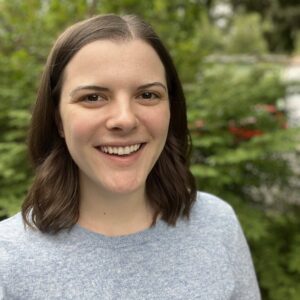
Are we American? Are we border people?
By Taneum Fotheringill
Director of Programs & Partnerships
Over the past several weeks, the Rural Assembly team has been sharing tidbits from our trip to visit old and new friends in the Rio Grande Valley. Daily Yonder reporter Sarah Melotte explored the tensions between the parts of ourselves which can feel at odds. Libby Lane transported us to the band room and the classroom with local student groups who shared their brilliance with us. As more of our colleagues prepare to board planes to the Rio Grande Valley to begin a week of filming, I’ve been thinking about movement.
I remember learning that within the United States there are checkpoints operated by Customs and Border Patrol when reading Conditional Citizens: On Belonging in America by Laila Lalami. One chapter begins with Lalami describing being pulled over at one such Texas checkpoint. “You might wonder, as I did when I found out about them, why the land of the free has so many checkpoints,” she writes.
While driving out to La Joya High School in our rented minivan, one of my colleagues remarked that everyone on the road seemed to be going the speed limit. We pieced together that it was because of the elevated presence of CPB and police in this border town. Getting pulled over for speeding is a gateway to other, more dangerous inquires. This was, of course, after driving alongside the visually and symbolically disturbing border wall earlier that day.
“Dehumanization is a feature of border walls,” writes Lalami. Our common humanity – and the ways in which we lose our sense of it – was an idea we had been getting immersed in from the moment we started planning our trip to South Texas.

So how do we relate to each other when we are separated by borders? Whether it’s a border between countries or the distance between urban and rural communities? These questions sat heavily with me, especially following the story circle co-hosted at the Museum of South Texas History the day before. Story circles are a form of group storytelling where each person tells about an experience related to a prompt. The stories build on each other and often create an overall experience centered around what we have in common. I reflected on some of what I heard in our session:
"Where does solidarity begin?"
“My dad just came up to me and he told me, this girl is from Honduras. And she lost the person who came with her… I'm looking at this kid who's the same age as me, and I'm like, what are we? Are we American? Are we border people? Are we ranchers? Where does the solidarity begin? What is the right thing to do?”
"She couldn't go back."
"My uncle passed away from Covid and my grandmother who was illegally over there in San Antonio, she had to come to the funeral and then, well, she couldn't go back… She couldn't go back because of the checkpoint, the immigration checkpoint."
"They're the ones who got me through."
“So anyway, for me, there were a few Anglo people that were really good, caring and loving. There weren't very many, but there were a few. And they're the ones that got me through. They actually grabbed my hand… they grabbed my hand and took me class to class to class and showed me how to register. I didn't know how to register. I didn't know the campus. And then I met my roommate and he took me, ‘this is how it's done.’”
Each of these quotes contain shreds of the larger stories told by the folks who we gathered with that Wednesday morning in South Texas. But even from the briefest of quotes, it’s possible to get a sense of how we can show up for one another. By sharing a glass of water or taking someone by the hand to guide them.
Stay tuned for more stories from the Rio Grande Valley at Rural Assembly’s upcoming Rural Assembly Everywhere later this year.

Taneum Fotheringill
Taneum Fotheringill is the Director of Programs + Partnerships at the Rural Assembly. Taneum takes pride in being a connector and looks forward to developing positive relationships with Rural Assembly communities across the country. Her work is informed by a lifelong interest in civics and the belief that everyone’s voice matters.







